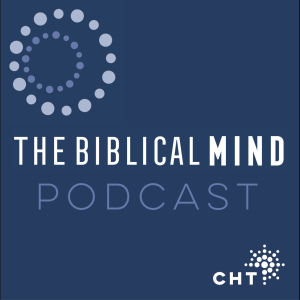The Biblical Mind
The Biblical Mind is dedicated to helping its audience understand how the biblical authors thought, promoting Bible fluency through curious, careful reading of Scripture. It is hosted by Dr. Dru Johnson and published by the Center for Hebraic Thought, a hub for research and resources on the intellectual world of the Bible.
The Biblical Mind is dedicated to helping its audience understand how the biblical authors thought, promoting Bible fluency through curious, careful reading of Scripture. It is hosted by Dr. Dru Johnson and published by the Center for Hebraic Thought, a hub for research and resources on the intellectual world of the Bible.
Episodes

Friday Jun 03, 2022
African Perspectives on Multiculturalism and Economic Justice (Gift Mtukwa)
Friday Jun 03, 2022
Friday Jun 03, 2022
The church should not only perform charity work, but also pursue economic justice.
Dr. Gift Mtukwa joins Dru Johnson to discuss the Kenyan church and Gift's Pauline scholarship. They examine the importance of multiculturalism in the church, which requires navigating cultural differences in language, worship style, and socioeconomic status. Additionally, Gift explains how reading Paul helps the modern Kenyan church understand poverty, economic opportunity, and financial prudence.
Gift Mtukwa is the Chair of the Department of Religion and Christian Ministry at Africa Nazarene University and lead pastor of the University Church of the Nazarene. Born in Zimbabwe, he now lives in Nairobi, Kenya. His research centers on contextual readings of Scripture, especially Paul's letters.
Show notes:
0:00 Different Kenyan tribes in the same church
3:16 The importance of diverse leadership
5:50 Explaining the Kenyan tribes
9:24 Kenyan impressions of majority-white churches
12:03 Evangelism in Africa
13:45 Paul's approach to multiculturalism
19:15 Understanding "if you don't work, you don't eat"
22:58 Poverty in rural and urban Kenya
25:34 How the church can help people in poverty
30:49 Pastoral education in economics and community development
33:33 Pros and cons of the American church
Show notes by Micah Long
Credits for the music used in TBM podcast can be found at: hebraicthought.org/credits.

Friday May 27, 2022
Friday May 27, 2022
This episode was originally published on February 4, 2022. In light of the Southern Baptist Convention's release of a report on sexual abuse within the denomination, we thought this episode was worth reissuing for our newer listeners.
This week, Rachael and Jacob Denhollander joined the podcast to discuss what reconciliation and restoration can look like following horrific abuse. Rachael Denhollander, a lawyer and former gymnast, rose to international prominence in 2016 when she became the first woman to publicly denounce and pursue criminal charges against former USA Gymnastics’ team doctor Larry Nassar, who sexually abused more than 500 girls and women. Rachael authored What Is a Girl Worth?, which explores her story in depth.
In cases of abuse and sexual misconduct within the church, Christians can become fixated on forgiving and forgetting, and fear what will happen if the church gets bad press. But God will continue preserving His church, hence our job is not to protect the church from critique; it is to pursue justice. Failure to do so systemically enables sexual abuse. Justice and reconciliation must go hand in hand.
Show Notes:
0:26 Is forgiveness necessary for reconciliation?
6:41 Returning to a proper understanding of God's justice
11:49 There's a cost to caring
17:32 The spirit of humility
20:25 Sexual violence and the church
27:04 God's justice
31:40 How do we restore what was broken?
34:11 Complicit organizations—can you forgive an organization?
Tweetable: "The church has an obligation to pursue justice because that's who God is."
Resources: https://erlc.com/resource-library/articles/6-ways-pastors-can-care-for-victims-of-sexual-abuse/
https://churchcares.com/
Show notes by Dominique LaCroix
Credits for the music used in TBM podcast: hebraicthought.org/credits.

Friday May 20, 2022
Who Is the ’Foreigner’ We’re Supposed to Love? (M. Daniel Carroll R.)
Friday May 20, 2022
Friday May 20, 2022
The history of humanity is the history of migration. People have always been on the move, in Scripture and in the modern day. Understanding the migrants near us, their experiences, and the languages they speak can equip us to love them better.
M. Daniel Carroll R., author of Global Migration and Christian Faith: Implications for Identity and Mission, explains our biblical obligation to love the foreigner, which includes not only people from a foreign country but also those with different socioeconomic backgrounds or even just very different life experiences.
Show notes:
1:07 Immigration in Scripture
4:11 Migration = people-moving
5:55 Dru's controversial view
7:15 Forced migration
12:45 Caring for the foreigner
20:46 The new has come
34:50 Language of the heart
Q&A: Email us your questions about the intellectual world of the Bible at cht_administrator@tkc.edu, and we'll answer them in an upcoming Q&A episode.
Show notes by Dominique LaCroix
Credits for the music used in TBM podcast can be found at: hebraicthought.org/credits.

Friday May 13, 2022
Knowing God through Welcoming the Stranger (Mark Glanville)
Friday May 13, 2022
Friday May 13, 2022
The Old Testament, especially Deuteronomy, repeatedly entreats the Israelites to welcome the stranger. The Israelites were required to love the stranger because God loves the stranger. In the gospels, Jesus practices this teaching continually, forming a makeshift family from the vulnerable around him. The church should likewise adopt the stranger and the vulnerable as family, because this is God’s design for humanity.
Mark Glanville, pastor and professor of pastoral theology, discusses the biblical ethic of welcoming refugees; his involvement in Kinbrace, a Canadian nonprofit that provides refugee housing and support; and how welcoming those on the margins can shape our view of Scripture and the world.
Show notes:
1:07 Welcoming refugees and Kinbrace
4:53 Welcoming is witnessing
6:53 Do Christians have a requirement to help refugees?
11:24 Addressing criminality
13:56 Exile
18:39 Shaping our view of the world
22:51 Kinship
35:20 Reading from diversity
Q&A: Email us your questions about the intellectual world of the Bible at cht_administrator@tkc.edu, and we'll answer them in an upcoming Q&A episode.
Show notes by Dominique LaCroix
Credits for the music used in TBM podcast can be found at: hebraicthought.org/credits.

Friday May 06, 2022
Reissue: Violence in the Bible Isn’t What You Think It Is (Matt Lynch)
Friday May 06, 2022
Friday May 06, 2022
This episode was originally published on October 16, 2020. We thought it was worth a reissue for our newer listeners.
Many readers of Scripture are jarred when God and Israel commit violence in the Old Testament. From the conquest of Canaan, to the lives of the biblical patriarchs, to the great flood in Genesis, we cannot avoid the fact that God and His people fight and kill. This can lead to a crisis of faith—how can God be good if He is violent?
Dr. Matt Lynch, Assistant Professor of Old Testament at Regent College, wants to reframe our questions; rather than merely worrying about God's use of violence, we could instead ask how the biblical authors are critiquing our use of violence. In this episode, Dr. Dru Johnson interviews Dr. Lynch about how the Bible portrays violence. They discuss Scripture's persistent connection between violence and tumult, and the difference between justified forceful harm and unjust violence. They also address the ethical connection between human beings and the rest of creation, and how violence in the Old Testament and New Testament separates humanity from God and the earth.
Show notes:
0:00 The problem of violence in the Old Testament and New Testament
2:25 Introducing Dr. Matthew Lynch and his work
7:12 Violence in Scripture versus violence in the modern world
11:50 War with the Canaanites in the book of Joshua
14:28 Ethics, ecology, and the environment
22:47 The New Covenant and our relationship to creation
24:24 The overarching perspective on violence in Scripture
29:15 Listening to the biblical texts for their questions
Dr. Lynch's new book: Portraying Violence in the Hebrew Bible: A Literary and Cultural Study
Show notes by Micah Long.
Credits for the music used in TBM podcast can be found at: hebraicthought.org/credits.

Friday Apr 29, 2022
Rituals Teach: Why We Can’t Ignore Leviticus (Mark Scarlata)
Friday Apr 29, 2022
Friday Apr 29, 2022
If God teaches us through rituals, then we have a responsibility to examine these rituals. By studying them, asking questions, and engaging with them, we can better understand God’s holiness.
The Book of Leviticus is concerned with so many aspects of life (what we eat, what we wear, etc.), and it offers us a holistic way to interact with the world and truly be set apart.
Rev. Dr. Mark Scarlata joins Dru Johnson this week to discuss his book, A Journey through the World of Leviticus: Holiness, Sacrifice, and the Rock Badger and how engaging with Leviticus and its laws can help us better understand God and the rest of Scripture.
Show notes:
0:26 Laying of hands and Leviticus
3:57 Tearing down walls of holiness (Leviticus 19)
11:04 Reaction to rules
18:30 Sacrificial animals and objects
24:15 Jesus’ concern with Leviticus
27:12 What do the Brits think about American Christians
Q&A: Email us your questions about the intellectual world of the Bible at cht_administrator@tkc.edu, and we'll answer them in an upcoming Q&A episode.
Show notes by Dominique LaCroix
Credits for the music used in TBM podcast can be found at: hebraicthought.org/credits.

Thursday Apr 28, 2022
Update: Now Accepting Questions for Upcoming Q&A Episodes!
Thursday Apr 28, 2022
Thursday Apr 28, 2022
We at the CHT and TBM are curious about your thoughts and questions regarding the intellectual world of the Bible! We’re now inviting listeners to send us questions, and we’ll start answering them in upcoming Q&A episodes. You can email us your questions at cht_administrator@tkc.edu.
Have you ever wanted to jump into a conversation between Dru and one of our guests? Do you want to probe more deeply into a topic of a previous episode? Or do you perhaps have a question on a topic we’ve never discussed, but that you think we could answer? We look forward to hearing from you!

Friday Apr 15, 2022
What Can Non-Jewish Clergy Learn from Jewish Studies? (Jeff Jacoby)
Friday Apr 15, 2022
Friday Apr 15, 2022
This week, Jeff Jacoby, op-ed columnist for The Boston Globe since February 1994, joined Dru to discuss his essay in Sapir, "Jewish Study for Non-Jewish Clergy." He proposes a project of study with deep historical roots that would benefit clergy and anyone who takes religion seriously, not just as an abstract intellectual exercise.
He writes, "Imagine that it were possible for non-Jewish clergy — Catholic, Muslim, Baha’i, Mormon, Baptist, Hindu — to have the opportunity to engage meaningfully with the world of Torah study from the inside, even if for only a limited time."
0:30 Essay in Sapir
3:53 The Jethro Project
13:58 The Jewish style of questioning on the spot
28:51 Why would this program be valuable?
33:00 Experiencing Sabbath in Israel
Credits for the music used in TBM podcast can be found at: hebraicthought.org/credits.

Friday Apr 08, 2022
Friday Apr 08, 2022
Certain modern stereotypes and gender roles influence how women and men in the church understand their humanity and sexuality. When people fall short of these expectations, they can feel inadequate. An idea that has pervaded church history is that men and women are polar opposites. Famous theologians have called women inferior. Regarding gender, what is actually "biblical," and what is merely cultural—and sometimes very harmful?
This week, Aimee Byrd critiques the stereotypes in light of her new book The Sexual Reformation, with an eye to restoring the dignity of personhood. She focuses mainly on the Song of Solomon to explore what the roles of men and women, married and single, truly are based on God’s spousal love for His people.
Show notes:
0:26 Am I feminine enough? Am I masculine enough?
4:57 The ideal human
7:45 Masculinity and aggression
11:26 Marriage as a picture of God’s love
13:20 The Aristotelian person
16:31 The effect on women
19:23 The last man standing is a woman
23:09 Women in Scripture
31:45 Embodied spirituality
34:40 You are valuable
38:00 What Aimee would say to those who disagree
Show notes by Dominique LaCroix
Credits for the music used in TBM podcast can be found at: hebraicthought.org/credits.

Friday Apr 01, 2022
A Look Back at Rethinking ’Quiet Time’ (Jen Wilkin)
Friday Apr 01, 2022
Friday Apr 01, 2022
This episode was originally published on January 1, 2021. We thought it was worth a reissue for our newer listeners.
Why do many Christians elevate the practice of "quiet time": isolated, often hurried and brief daily Bible-reading? Jen Wilkin—author, speaker, and leader of many Bible studies—challenges this practice. She believes that, rather than instilling deep Bible literacy, the typical "quiet time" encourages shallow reading and pursuit of instant gratification in the form of cheap satisfaction or vague encouragement at the expense of comprehension.
Reading any book this way would not yield a thorough grasp of its themes, narrative, characters, and worldview, Jen says, so why read the Bible this way? While affirming its inerrancy, Jen cautions against treating Scripture like a magic 8-ball. The practice of quiet time is indeed formative, but not necessarily for the better. She proposes an alternative method of Bible study involving, among other things, extended (if not daily) reading and regular input from other careful Scripture-readers.
Show notes:
0:25 The problem with "quiet time"
8:06 English literature and magic 8-balls
18:56 Setting low expectations for Bible literacy in the church
23:17 The effectiveness of raising the bar
31:21 Why Jen Wilkin focuses on an audience of women
Credits for the music used in TBM podcast can be found at: hebraicthought.org/credits.






